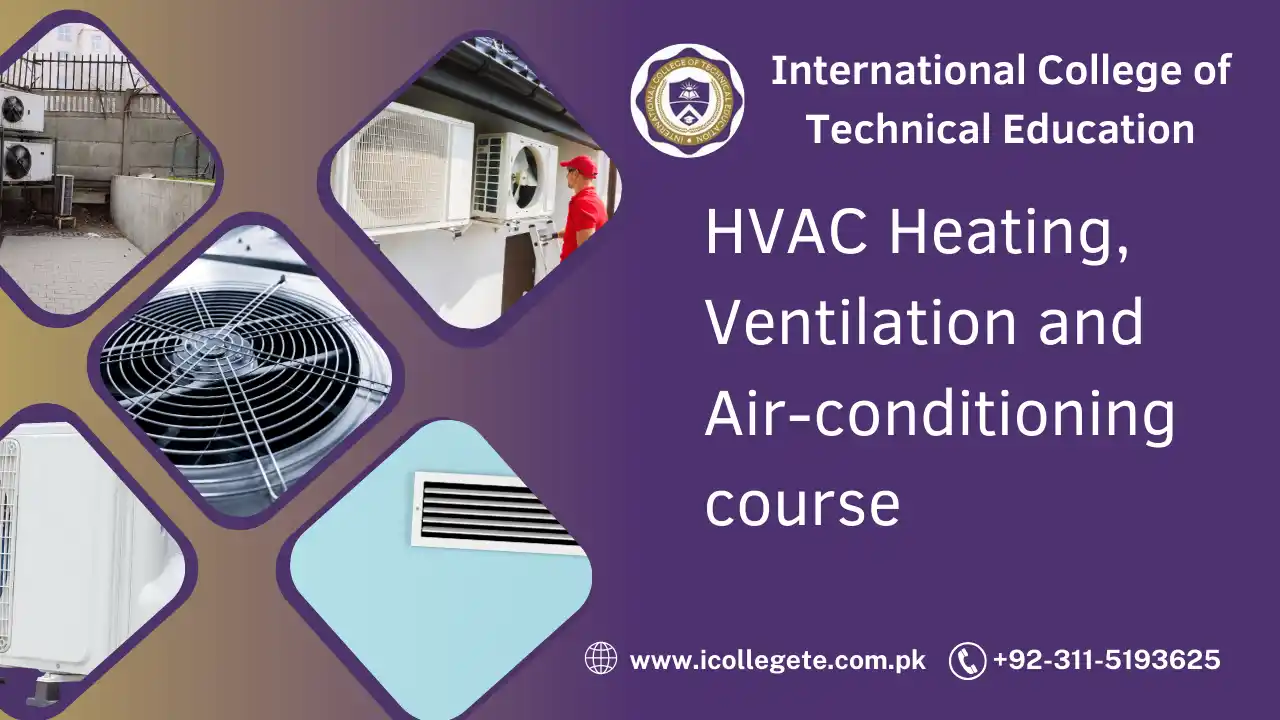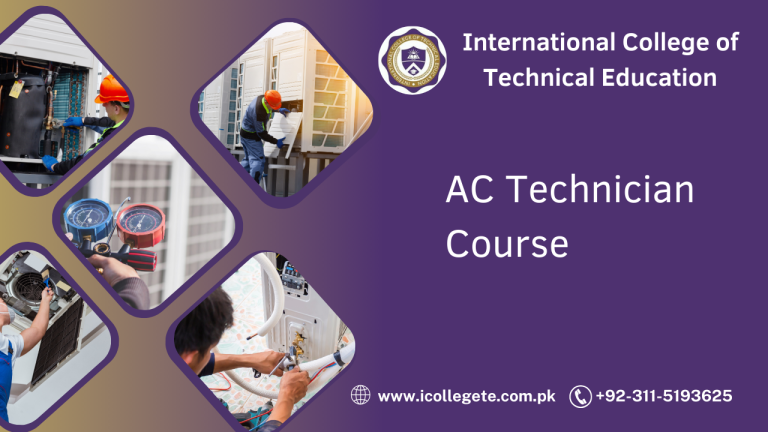The demand for skilled professionals in the heating, ventilation, and air-conditioning (HVAC) industry is higher than ever. Whether it’s for residential, commercial, or industrial applications, HVAC systems play a crucial role in maintaining comfortable living and working environments.
The HVAC Heating, Ventilation, and Air-conditioning Course in Faisalabad is designed to provide students with the skills and knowledge to become proficient HVAC technicians. Whether you want to work in residential, commercial, or industrial settings, this course equips you with the expertise needed to install, maintain, and troubleshoot HVAC systems.
From understanding the science behind heating, ventilation, and air-conditioning to hands-on training with equipment, this course prepares you for the challenges and demands of the HVAC industry.
Course Overview
This course provides both theoretical and practical knowledge of HVAC systems. It covers everything from the basic principles of thermodynamics and refrigeration cycles to more advanced topics such as energy-efficient systems and smart HVAC technology. The course includes detailed modules on the installation, maintenance, and troubleshooting of HVAC systems, making it ideal for those seeking to enter the field or upgrade their existing skills.
With hands-on training and exposure to industry-standard equipment, this course ensures that students are job-ready upon completion.
Study Units
The HVAC Heating, Ventilation, and Air-conditioning Course in Faisalabad is broken down into several key study units, each focusing on an essential aspect of HVAC technology. These units include:
- Introduction to HVAC Systems
- Basic principles of heating, ventilation, and air-conditioning
- The importance of HVAC systems in residential, commercial, and industrial environments
- Overview of HVAC components and their functions (e.g., compressors, condensers, evaporators, and thermostats)
- Thermodynamics and Refrigeration Cycle
- Understanding heat transfer, pressure, and temperature relationships
- Exploring the refrigeration cycle and how it applies to HVAC systems
- Learning about refrigerants and their role in cooling and heating systems
- HVAC System Installation
- Step-by-step guide to installing HVAC systems in residential, commercial, and industrial settings
- Proper sizing, ductwork design, and equipment placement
- Electrical connections and troubleshooting during installation
- Ventilation Systems and Air Quality
- The importance of ventilation for air quality and energy efficiency
- Types of ventilation systems: mechanical, natural, and hybrid
- Indoor air quality (IAQ) and its impact on health and productivity
- HVAC System Maintenance and Troubleshooting
- Routine maintenance tasks for HVAC systems (cleaning filters, checking refrigerant levels, inspecting ducts)
- Troubleshooting techniques for common HVAC problems (cooling issues, airflow problems, refrigerant leaks)
- How to use diagnostic tools to identify faults in HVAC systems
- Energy Efficiency and Sustainable HVAC Systems
- Understanding energy-efficient HVAC systems and their benefits
- Introduction to green technologies like geothermal heating and cooling, and solar-powered HVAC
- Sustainable practices in HVAC installation and maintenance
- Advanced HVAC Technologies and Smart Systems
- Exploring smart HVAC systems and home automation integration
- Use of sensors, controls, and IoT in HVAC systems
- Understanding the future of HVAC technology and its role in modern buildings
Learning Outcomes
Upon completing the HVAC Heating, Ventilation, and Air-conditioning Course, students will be able to:
- Understand the fundamental principles of HVAC systems, including heating, cooling, and ventilation.
- Install, maintain, and repair HVAC systems across various settings (homes, offices, factories, etc.).
- Identify and troubleshoot common HVAC issues using diagnostic tools and techniques.
- Work with energy-efficient HVAC technologies and sustainable systems.
- Design and install ventilation systems to ensure optimal air quality.
- Implement smart HVAC systems and integrate them with modern technologies like automation and IoT.
- Understand the environmental impact of HVAC systems and promote sustainability in installation and maintenance.
Course Benefits
- High Demand for HVAC Professionals: HVAC technicians are always in demand due to the essential nature of their work. With the rapid growth of urbanization and the increasing focus on energy efficiency, skilled HVAC professionals are needed more than ever.
- Hands-on Training: This course includes practical training with real HVAC equipment, ensuring that you gain the necessary experience to work in the field immediately after certification.
- Wide Range of Career Opportunities: After completing the course, you will be equipped to work in a variety of sectors, including residential, commercial, and industrial HVAC. You can also pursue roles as an independent contractor or technician for HVAC service providers.
- Career Growth and Advancement: The HVAC industry offers many opportunities for career advancement. As you gain experience, you can move into supervisory or managerial roles or specialize in areas like energy-efficient systems or smart HVAC technologies.
- Competitive Salary: HVAC technicians are well-compensated, with salaries typically higher than many other technical professions. Additionally, there is room for growth as you acquire more certifications and experience.
- Job Security: HVAC systems are essential, and as long as buildings require climate control, the need for skilled technicians will continue to grow. HVAC professionals are also crucial during emergencies, such as system breakdowns or extreme weather conditions.
Who Is This Course For?
The HVAC Heating, Ventilation, and Air-conditioning Course is suitable for:
- Aspiring HVAC Technicians: Individuals who want to start a career in the HVAC field.
- Current Technicians: Those already working in the HVAC industry who want to enhance their skills and knowledge.
- Electricians or Plumbers: Professionals with a background in electrical work or plumbing who wish to expand their expertise to include HVAC systems.
- Engineering Students: Individuals studying engineering who are interested in specializing in HVAC technology.
- Business Owners: Entrepreneurs or business owners looking to offer HVAC installation and maintenance services.
Future Progression for This Course
After completing the HVAC Heating, Ventilation, and Air-conditioning Course, there are numerous career paths available, including:
- HVAC Technician: Work as an entry-level technician performing installation, maintenance, and repairs on HVAC systems for residential, commercial, and industrial clients.
- HVAC Supervisor or Manager: With additional experience, move into a leadership role overseeing teams of technicians, managing projects, and ensuring high-quality service.
- Energy Efficiency Consultant: Specialize in energy-efficient HVAC solutions, helping businesses and homeowners reduce energy consumption and environmental impact.
- HVAC System Designer: Work as a designer or engineer, creating custom HVAC solutions for large commercial or industrial buildings.
- Entrepreneur/Business Owner: Start your own HVAC business, offering installation, repair, and maintenance services to a wide range of clients.
- Advanced Certifications: Pursue further certifications in specialized areas such as green technologies, refrigeration, or smart HVAC systems, allowing you to specialize and increase earning potential.
The HVAC Heating, Ventilation, and Air-conditioning Course in Faisalabad offers an excellent opportunity to enter one of the most essential and rapidly-growing industries. With the skills and knowledge gained from this course, you will be well-prepared to work with HVAC systems and build a successful career in this dynamic field. Whether you’re looking for a hands-on job or aiming for a managerial or entrepreneurial role, the HVAC industry offers diverse and rewarding opportunities. If you’re ready to take the next step toward a thriving career in climate control, this course is the perfect place to start!







